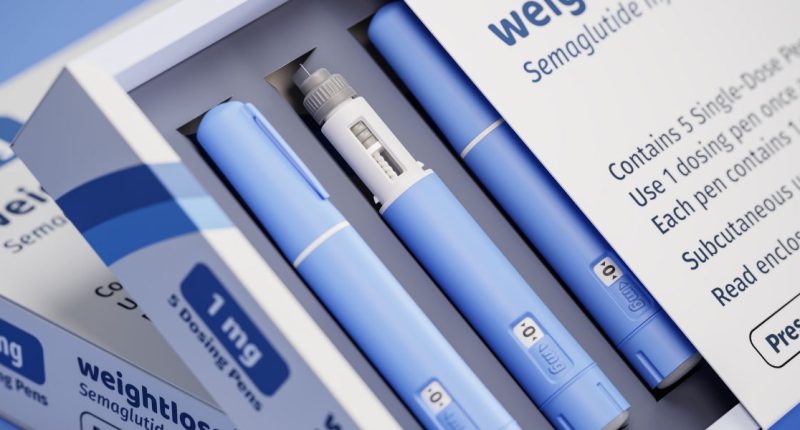The first generic versions of expensive weight loss jabs will hit the market soon, with experts predicting a surge in uptake thanks to the lower price tag.
With patents running out on some of the big names in weight loss jabs, pharmaceutical companies are making huge efforts to produce cheaper generic versions for people paying privately.
Injections including Wegovy and Ozempic reduces appetite by mimicking the gut hormone GLP-1.
They can help people lose more than 10% of their body weight and have been made popular thanks to celebrities promoting the effects.
- Experts sound alarm over ‘quick fix’ weight loss jab misuse
- Weight loss triggered by GLP-1 receptor agonists
- Sugar source can be more harmful to children’s weight than sugar content, researchers find
Wegovy and Saxenda are licensed for weight loss, while Ozempic and Victoza are used to treat type 2 diabetes but are often prescribed to help with weight loss.
Some are available to NHS patients but they are expensive to buy privately. Recent shortages have also made them difficult to get hold of.
There are hopes that the availability of cheaper versions could help more people.
Pharmaceutical companies are now working on generic versions of Victoza and Saxenda after their patents expired, including the world’s largest generic drugmaker, Teva Pharmaceutical Industries which recently launched a generic version of Victoza in the US.
London-based Hikma Pharmaceuticals’ generic version of Victoza has recently been approved, while other drugmakers are said to be launching their own liraglutide products, which is the active ingredient in Victoza and Saxenda.
Ozempic and Wegovy patents run out in 2026 in China, in 2031 in Europe and Japan, and in 2032 in the US.
Mark Samuels, the chief executive of the British Generic Manufacturers Association (BGMA), said the availability of generic weight loss medicines could be a “potentially transformative opportunity for public health”.
He said: “The current market is largely private via patients who are self-paying. The cost of the patented medicine is often prohibitive for the NHS, so it has been sparingly prescribed by clinicians.
“However, the onset of generic competition will likely significantly reduce the price, and this means the NHS can afford to treat more patients. This has a broader population health benefit as greater access to these medicines will reduce the crippling strain obesity-related conditions have on NHS resources.”
Generic version of drugs typically reduces the price paid by the NHS by as much as 80% to 90%.
- People with type 2 diabetes show improvement following oral semaglutide treatment
- 1500% surge in semaglutide overdose reports
- Experimental weight loss jab is 5 times more effective than Wegovy and Ozmepic
Dr Simon Cork of Anglia Ruskin University Cork said cheaper options would be a positive step, in part because current drugs can only be prescribed for use for two years on the NHS for those who are eligible.
He said: “This was introduced in no small part because of the questionable cost effectiveness of their continued use. A reduction in the cost would shift the balance of this cost effectiveness, potentially paving the way for their longer-term use – especially when coupled with research showing the reversal of weight loss after patient stop taking them, and the continued benefit in cardiovascular risk associated with longer term use.”
Prof Giles Yeo, from the University of Cambridge, said the point at which semaglutide, the active ingredient of Ozempic and Wegovy, is made as a generic will be a major turning point.
He said: “A powerful drug will then be available to the vast majority of the world, which would be amazing.”
The Association of the British Pharmaceutical Industry defended the use of patents, saying developing drugs was a high-risk process which can cost around $2.3bn.
Experts said the arrival of cheaper versions of the weight loss jabs should also reduce the number of people trying to create their own makeshift versions, or buying unregulated versions online.



